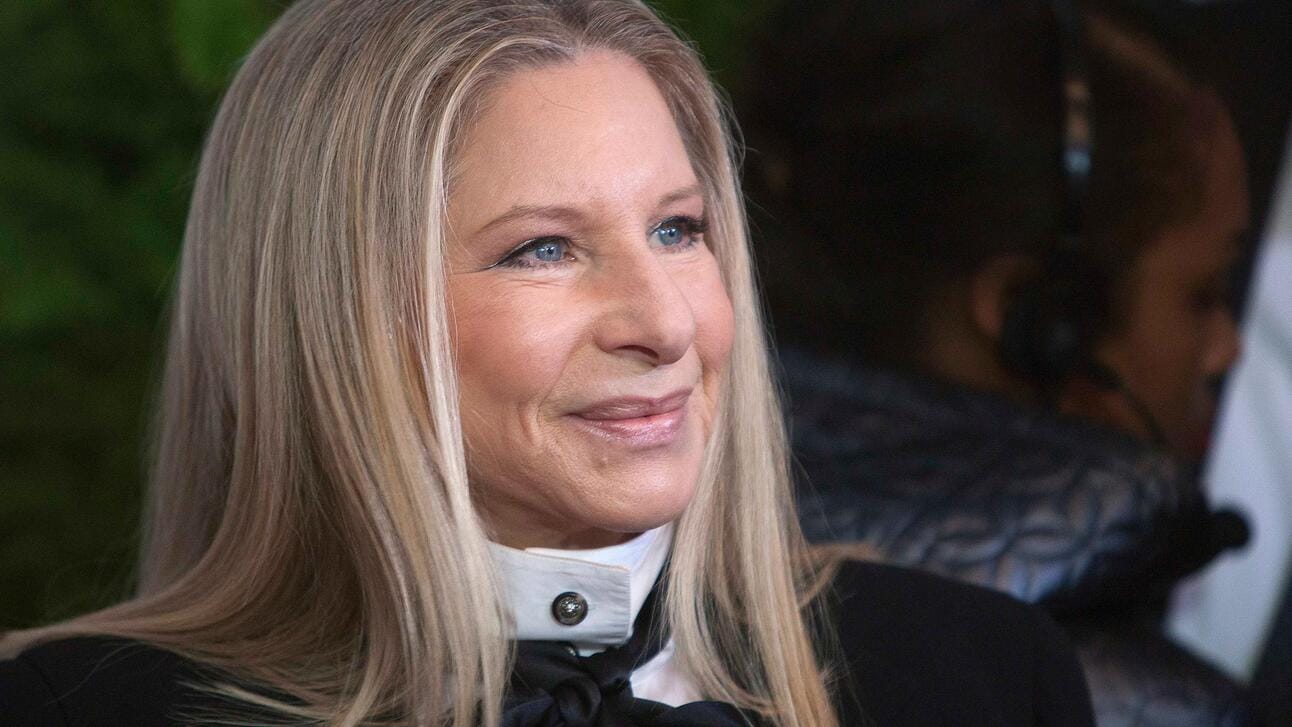- The Weekly Mensch
- Posts
- The Weekly Mensch: Barbra Streisand
The Weekly Mensch: Barbra Streisand
The ultimate pragmatic vision of an ambitious virtuoso of truth, beauty, and leadership
Us in a Nutshell
We are passionate about the lives, the impact, and the experience of Jewish baby boomers who have changed our world. From finance to the arts, we write about the stories of contemporary heroes who — significantly and meaningfully — changed the face of their respective industries, often starting with nothing but a legacy of exile. We tell their stories for the timeless lessons of intelligence, ethics, and resilience they underline. And we also share some fun anecdotes! Nathan Tob is a fourth-year student at the Queen Mary University of London. He studies Economics, Finance, and Management. Davy Sokolski is a third-year student at Columbia University in New York. He studies International Political Economy.
What is a Mensch?
Leo Rosten defines mensch as “someone to admire and emulate, someone of noble character.” Dr. Saul Levine writes in Psychology Today that a mensch’s personality characteristics include decency, wisdom, kindness, honesty, trustworthiness, respect, benevolence, compassion, and altruism.
Barbra’s Rapid Bio

Barbra Streisand, born April 24, 1942, in Brooklyn, New York, grew up in a modest Jewish household. Her father, Emanuel, a high school teacher, passed away when Barbra was just 15 months old, leaving her mother, Diana, to raise her and her older brother. Despite financial challenges, Streisand's early life was filled with aspirations shaped by her Jewish heritage and her mother’s love for music. As a teenager, she dreamed of becoming an actress, undeterred by those who dismissed her unconventional looks.
After graduating from Erasmus Hall High School, Streisand began performing in nightclubs, captivating audiences with her unique voice and magnetic presence. She made her Broadway debut in I Can Get It for You Wholesale (1962), earning a Tony nomination, and her first album, The Barbra Streisand Album (1963), won two Grammys, launching her recording career.
Streisand transitioned to film with her Oscar-winning performance in Funny Girl (1968) and starred in classics like The Way We Were (1973) and A Star is Born (1976). She broke barriers as a director, making her debut with Yentl (1983). This project explored Jewish identity and gender roles, earning critical acclaim and a Golden Globe for Best Director—the first woman to achieve this honor.
Beyond entertainment, Streisand is a passionate philanthropist. In 1986, she established the Streisand Foundation, which supports causes like women’s rights, civil liberties, and environmental conservation. She also founded the Barbra Streisand Women’s Heart Center at Cedars-Sinai and has donated to Jewish cultural and educational initiatives, including projects in Israel.
With two Oscars, 10 Grammys, five Emmys, and countless other accolades, Streisand’s career spans six decades, making her one of the most influential performers in history. She is celebrated for her artistic achievements and her commitment to using her platform to advocate for justice, equality, and progress.
Barbra’s Five Lessons
1. Simplicity is the highest level of sophistication
For Barbra Streisand, acting has been a life mission she accomplished. Starting theatre classes at a very young age, she pushed herself to perform but later revealed that her career made her realize that simplicity was in fact the most complex yet true perfection. “When I was in acting class, there was a guy that had absolutely no charisma. We would play scenes that he could not do, but during relaxation exercises, that guy became fascinating and the single movement of an eyebrow raising became interesting.” For Barbra, plain, raw, simple, but true acting was the culmination of years of experience as well as the most sophisticated form of art. This is because actors, she says, must continually pursue truth: “A great actor has to rely on the truth. The audience knows when you’re telling or singing the truth.” Ornaments and overly bold acting make a scene less pure, less relatable for the audience, and less engaging for the actors and the directors.
If Streisand’s ode for simplicity holds true in filmmaking, it is definitely true in life and business as well. The essence of a relationship or that of a product is only truly attained once ornaments are cut to the minimal. As Apple’s famous designer Jony Ive once said: “Simplicity is not the absence of clutter, that's a consequence of simplicity. Simplicity is somehow essentially describing the purpose and place of an object and product. The absence of clutter is just a clutter-free product. That's not simple.”
2. Vision is useless when not balanced with reality
During the making of Yentl, Streisand balanced the vision she had of the aesthetic behind every single scene with the realities of filmmaking that she discovered for the first time. She talks about a rainy filming day during which she had to weigh the decision of reporting an entire program to the next day so that she would get the sun shining as a symbol of hope as Yentl goes to school. Barbra was amongst the first women directors and talked about the pressure and the lack of trust she faced as she had to handle budgets. However, against what people could think of her, balancing the realities of budget management was paramount for her as she deeply believed that vision alone did not make sense with no clear understanding of reality. This pragmatism she inherited from her family – as many other Ashkenazi baby boomers had – enabled her to be even more aware of pragmatic considerations in an environment that could seem contradictory to her family background.
Streisand’s career as a director is a testament to the need to balance dreams and vision with down-to-earth pragmatism. If both seem antithetical at first, one cannot survive without the other. It echoes the old saying: “Keep your eyes on the Stars, Your feet on the Ground, and don't forget the Tent.”
3. Being a director is pushing the actors to be their best
In Yentl (1983), Streisand, as a director, was almost editing the film on set, instructing the team of each part she wanted to keep from every take – thus revealing the talent of the actors more effectively. For Streisand, being a director was all about pushing the actors to the best of their performance. For his role in The Prince of Tides (1991), Nick Nolte was nominated for the best actor; this recognition, she says, “was the best award for me as a director.” For Barbra, being a director is all about setting an environment and working through a process through which she manages to reveal the cast's best performance. In a sense, “you have to be loving as a director,” she recognizes as the entire job relies on empowering and magnifying the job of the actors on set and during editing. Getting the best from her actors was a mission she took very seriously, leaving her Beverly Hills house in her caravan so that she would not lose a second of production or being sometimes very tough on her teams.
Barbra’s approach to directing offers a universal lesson in leadership; true leaders amplify the strengths of their team. By focusing on empowering her actors rather than centering herself, she created revolutionary work. Barbra took immense pride in the awards actors received through her own films because that was the highest level of recognition she could get. Streisand reminds us that impactful leadership is about collaboration, trust, and the unwavering commitment to helping others shine.
4. There was just no other way around
When she was younger, Barbra’s mother told her she had to start taking typing classes so she could find a job in the administration of a school, to get similar benefits and stability as her father who was a teacher. But for Barbra, destiny looked much different, in an interview she gave with 60 Minutes, she says that “she always knew she would be Barbra Streisand, because there was no other way around.” Some often talk about Streisand’s long nails which are, she says, a testimony of her willingness to go against the traditional path as nails made it impossible for her to type and to attend typing classes her mother recommended. Barbra had bold ambitions, a game plan, and most importantly the unshakable conviction that she would become the person she imagined and dreamed to be. There was no other way around. This was her life purpose and everything she did, every hardship, every joy, and every lesson she got along the way was centered and leveraged to build her journey.
Barbra’s unshakable willingness to succeed and her radical conviction that she would become Barbra Streisand was her stronger drive to succeed. She did not consider alternatives and rejected everything that wasn’t part of that vision, while programmatically turning every experience into a catalyst for becoming who she wanted to be. She was sure about it, and that was actually the best way to make it happen.
5. Fame is not glory
For Barbara Streisand, fame was never about taking pleasure in the spotlight, rather it was about a platform for purpose. In 1988, moved by the tragedy of Chornobyl, she launched the Streisand Foundation, championing causes like nuclear disarmament, women’s rights, and environmental protection. While fame gave her access to influential platforms, she used it judiciously, focusing on causes that mattered to her deeply. Barbra often reveals being uncomfortable with fame, such as with the following rather funny saying: “My biggest nightmare is I'm driving home and get sick and go to hospital. I say: 'Please help me.' And the people say: 'Hey, you look like...' And I'm dying while they're wondering whether I'm Barbra Streisand.” Yet, Streisand’s relationship with fame often veered toward humor. When Apple’s Siri repeatedly mispronounced her name, she personally called Tim Cook, to ensure it was corrected. It was a lighthearted reminder of how fame can sometimes open doors-but it wasn’t her defined legacy.
Streisand’s life illustrates that what you do with your fame is what endures. Her focus was never on the applause but on how she could use her influence to advocate for meaningful change. True glory isn’t about recognition, it’s about what you choose to stand for and the impact you leave behind.
The Quote of The Week
“Myths are a waste of time. They prevent progression”




Reply